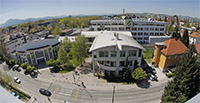Context of the Action
The main objective of the Action is to harmonise research and practice on design and evaluation methodologies for computing artefacts, across sectors and disciplines.
Third-wave human computer interaction (HCI) is characterised by a diversifying user base and use contexts, new emphasis on user experience and new interaction styles. This implies a need for informed method choice sensitive to domains, user groups and system objectives. Effective method use requires complex judgments about applicability across applications and genres, with failure implying significant financial and human costs. The adoption of ICT across ages and abilities further increases the need for sound D&E methods, which bring about useful, usable, desirable computing artefacts that improve life quality. Effective cross-sectorial transfer of design and evaluation (D&E) methods is plausible and demonstrable. Relevant research work, however, is fragmented and scattered.
The Action aims to provide harmonization and leadership currently lacking in this field by bringing together researchers and D&E professionals. Their broad experience of D&E methods deployed in different sectors and disciplines enables comparison of method applications, assessing transferability of both established and novel approaches. These collaborative activities in Working Groups and open Workshops will facilitate production of a generic D&E method selection and application framework and scientific publications reaching the wider research community. The Action will also provide young interdisciplinary researchers with systematic training and networking opportunities such as STSMs and Training Schools.
Objectives
The main objective of the Action is to integrate and foster research and practice on design and evaluation methodologies for computing artefacts across sectors and disciplines. More specific objectives include:
- To critically examine the current use of design and evaluation methods and contribute to the maturation of those methods;
- To identify and analyse sector-unique design and evaluation methodologies in terms of their underlying conceptual models, practical protocols, and transferability to other sectors;
- To identify and critically review the quality attributes and software standards that are currently prioritized in design and evaluation processes in different sectors;
- To develop a generic method selection and application framework that effectively leverage and support interdisciplinary and cross-sectorial design and evaluation solutions;
- To provide young design and evaluation researchers with training opportunities by leveraging the diverse expertise and research projects being integrated in the Action.
Scientific Program
Four major R&D activities will be implemented by of four Working Groups (WGs):
WG 1: Critical Reviews of D&E Method Potential and Value-Realisation in IT-enhanced Sectors.
This activity will critically examine the current use of design and evaluation methods and contribute to the maturation of those methods
WG 2: Transferability of D&E Methods across IT-enhanced Sectors
The primary objective of this activity is to identify and analyse sector-unique design and evaluation methodologies in terms of their underlying conceptual models, practical protocols, and transferability to other sectors.
WG 3: Interplay between Design and Evaluation, Quality Models and Standards
The main goal of this activity is to identify and critically review the quality attributes and software standards that are currently prioritized in design and evaluation processes in different sectors.
WG 4: Integrated D&E Methodological Framework
This activity is concerned by the development of a generic method selection and application framework that effectively leverage and support interdisciplinary and cross-sectorial design and evaluation solutions.


